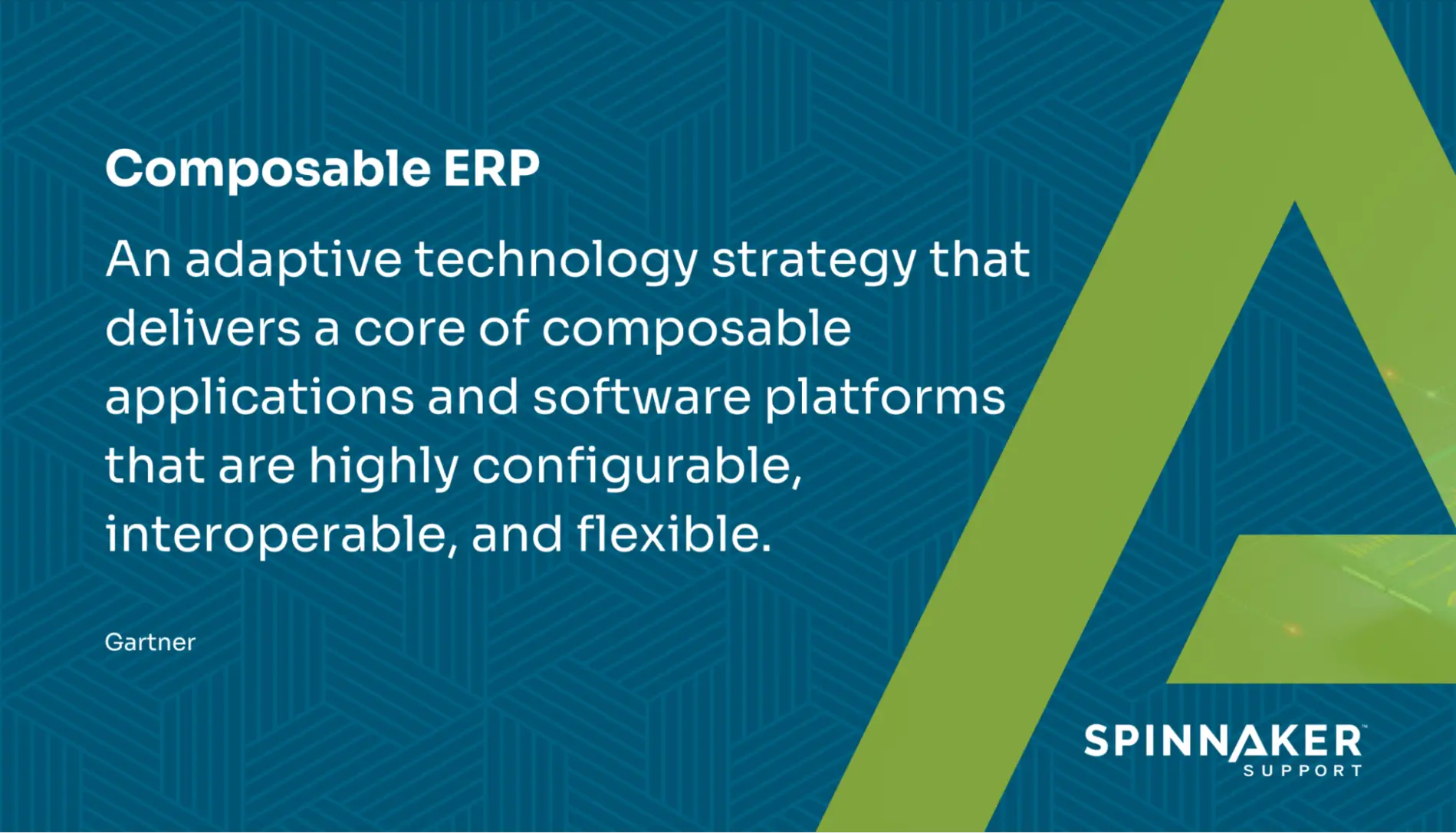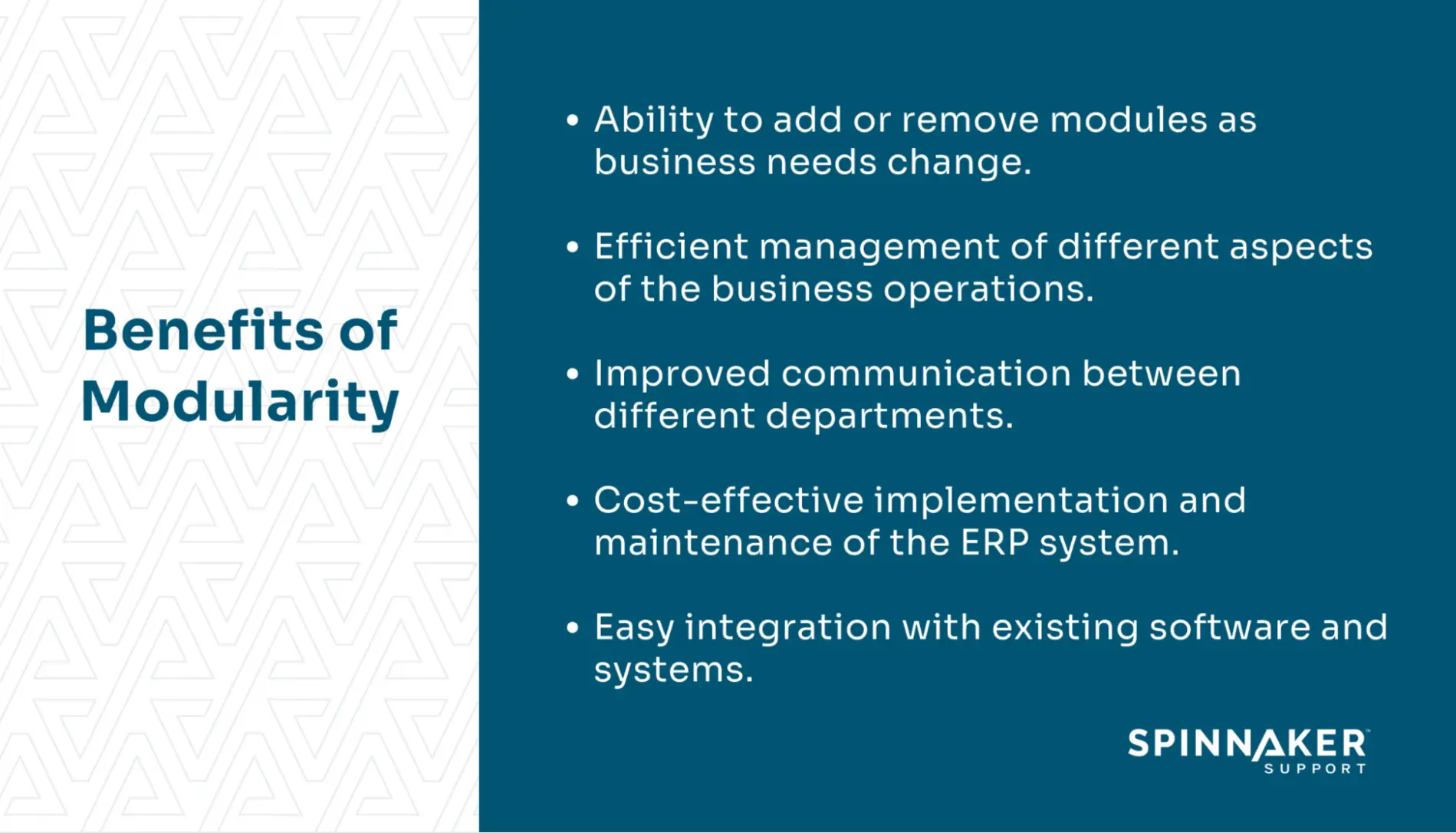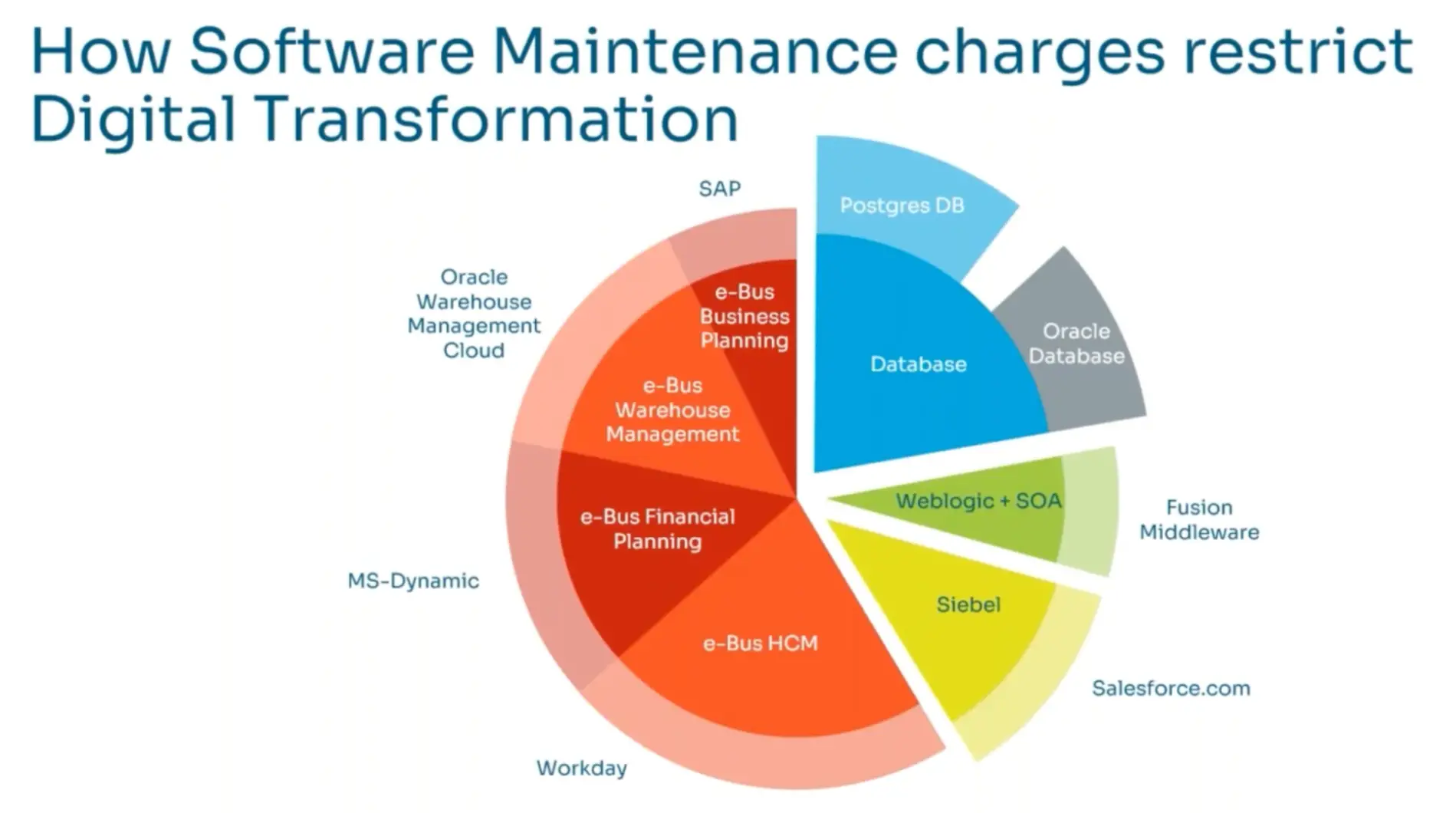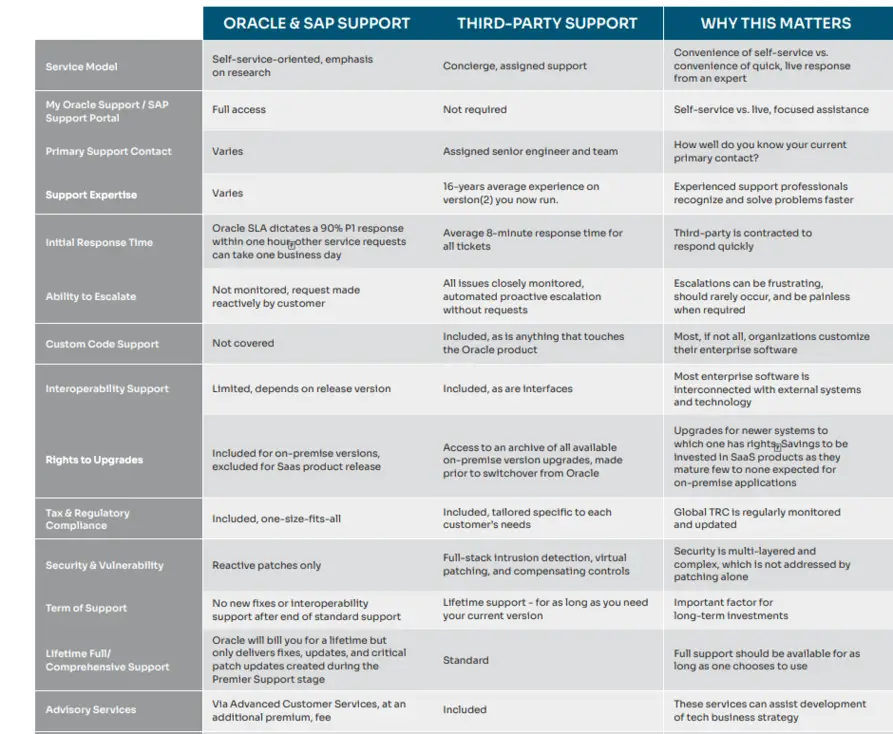
Enterprise resource planning (ERP) systems help automate and streamline business processes, such as inventory management, finance, and human resources. However, traditional ERP systems often encounter challenges due to their monolithic nature.
These systems can be difficult to customize, resulting in limited agility and scalability. Integrating new functionalities or third-party applications can also be complex and time-consuming. Such limitations hinder organizations from adapting to evolving business requirements.
Enter composable ERP, a transformative solution that addresses these challenges. Composable ERP takes a modular approach, allowing businesses to add, remove, or configure components as needed. This flexibility empowers organizations to tailor their ERP systems to meet specific needs, providing greater agility.
In this article, we’ll dive deep into what composable ERP is, its benefits, challenges in implementation, and how you can overcome those challenges with a third-party support provider.
What is composable ERP?
Composable ERP is an adaptive technology strategy where businesses can customize their ERP components to align with their unique requirements instead of being locked into a one-size-fits-all solution.

This level of customization enhances efficiency and improves business outcomes. It allows businesses to optimize their operational capabilities in a dynamic and competitive market.
The concept behind this is ‘composable thinking,’ a term coined by Gartner, to promote the idea of building adaptable, scalable, and interoperable systems that business leaders can customize to meet their specific needs.

With its modular architecture and customizable components, composable ERP revolutionizes how businesses manage resources.
For example, a finance-based organization can keep a financial planning module as its core ERP component. But it can choose risk management, order management, and other enterprise business capabilities (EBCs) as composable or movable.
This can help businesses adapt to changing situations quickly. Composable ERP may seem similar to best-of-breed systems, but some differences exist.
Firstly, it allows businesses to build customized solutions by combining modular components. In contrast, best-of-breed systems are pre-packaged solutions.
Additionally, composable ERP provides scalability, enabling businesses to easily add or remove modules as needed, while best-of-breed systems may require complex integration efforts to achieve scalability.
Benefits of composable ERP
Gartner predicts that 70% of large and medium organizations will have composability as a key criterion for new application planning by 2024.

Here’s how a composable ERP strategy can help you.
Flexibility
Composable ERP allows businesses to customize and adapt their systems.
Businesses can quickly adjust their strategies, products, and services to meet evolving customer demands. This flexibility allows companies to experiment with new ideas, technologies, and processes, fostering innovation and creating opportunities for growth and expansion.
Additionally, being flexible enables businesses to:
- Tailor their offerings to meet customer needs and preferences, enhancing customer satisfaction and loyalty
- Navigate uncertainties and disruptions, such as economic downturns, ensuring resilience and effective risk management
- Integrate with other systems through APIs and microservices, facilitating better connectivity and data sharing
For example, a company can easily integrate new modules and modern technologies as their requirements evolve without undergoing extensive system overhauls.
Scalability
With a composable ERP, businesses can scale their operations to align with their growth strategies without disrupting the existing processes.
For instance, a retail company expanding into e-commerce can quickly integrate an online storefront module to enhance its digital presence.
Interoperability
Composable ERP enables businesses to integrate and communicate with other systems and applications seamlessly. This allows for the exchange of data and information between different departments or even external partners.
For example, a manufacturing company can connect its ERP system with its suppliers’ systems to automate the procurement process and ensure a smooth supply chain.
Modularity
Composable applications are built on a modular architecture, where each component or module serves a specific purpose, also called microservices. Modularity allows businesses to select and implement only the relevant modules to their operations, avoiding unnecessary complexity.

For instance, a service-based company can implement modules for project management, resource allocation, and customer relationship management while skipping modules for inventory management or production planning.
Microservices also enable more manageable maintenance and updates, as changes can be made to individual services without impacting the entire system.
Agility
Composable ERP provides businesses with the agility to quickly respond to changing business needs and market demands.
For example, a company that launches a new product line can swiftly incorporate the necessary modules for product development, inventory management, and sales tracking.
Cloud nativity
Composable ERP promotes the concept of cloud nativity. Cloud nativity enables organizations to leverage the full power and scalability of cloud computing. That’s why it’s one of the top emerging technology trends.
Cloud-native business applications use cloud infrastructure to provide scalability, automated resource management, affordability, and rapid deployment. Organizations can easily integrate with other cloud-based systems and services to enable streamlined operations.
Omnichannel experience
Omnichannel is a benefit of composable ERP because it allows businesses to provide a consistent customer experience across multiple channels.
With an omnichannel approach, customers can interact with the business through various touchpoints, such as physical stores, websites, mobile apps, social media platforms, and more.
This integration of channels enables customers to have a cohesive and integrated shopping experience, where their preferences, shopping history, and data are synced across all channels.
By offering an omnichannel experience, businesses can enhance customer satisfaction, improve brand loyalty, and increase sales and revenue.
Composable ERP: Factors to consider
There are some factors to consider when building a composable ERP environment.
Mindset shift
95% of organizations struggle with developing a vision for digital change. And most digital change in today’s technological landscape is about you requiring a mindset shift. The same goes for ERP. We must understand that composable architecture should be nimble enough to let organizations pivot — it shouldn’t be just about adding or deleting components.
Yes, it’s technology, but it doesn’t depend on technology to dictate business. It suggests that IT should align with business processes.
Traditional ERP works on the principle of ‘how to enhance the longevity of our systems’ and risk avoidance. Composable systems are built to adopt change and risk acceptance. In fact, composability is essential in today’s digital era to adapt to disruptions.
For example, you may now use Workday for your everyday HR operations. But a few years later, you can find a more advanced and affordable solution. Composable ERP will help you do that instead of continuing to work on an HR system that doesn’t serve your purpose.
Data security
Interoperability refers to the ability of different software applications and platforms to exchange data and work together. It reduces data silos, enables real-time data synchronization, and ensures all systems access the most up-to-date information.

However, it’s essential to note that while interoperability is crucial for business operations, it can also introduce certain data security risks like vulnerabilities and potential breaches.
Organizations must then consider implementing data governance practices. Data governance practices help mitigate the risks associated with interoperability. It includes aspects such as data classification, data access controls, data retention, and data privacy.
Right skills
It’s essential to have a team equipped with the necessary expertise and knowledge to leverage the advantages of a composable ERP approach effectively.
These skills include proficiency in system integration, API management, microservices architecture, cloud computing, and agile development methodologies.
Additionally, a deep understanding of business processes and industry-specific requirements is necessary to tailor the strategy accordingly.
Responsive support
With composable ERP, the concept of ‘responsive support’ becomes crucial.
Unlike traditional ERP systems like SAP and Oracle, which often have expensive support, composable ERP requires a different approach to support.
The traditional support methodology may not be suitable for composable ERP because of its modular nature. Instead, support needs to be more responsive and adaptable to the specific needs and configurations of the composable ERP strategy.
So, what’s the solution?
To answer that, let’s first understand the limitations you can face with publisher support.
Vendor lock-in: your #1 challenge
Your primary goals for ERP transformation could be one or all of these:
- Architectural freedom
- Responsive service
- Enhanced security
- Business stability
However, these goals can be challenging to achieve with vendor lock-ins. What are vendor lock-ins?
Vendor lock-in in ERP support refers to a situation where an organization becomes heavily dependent on a particular vendor for their ERP system, making it difficult to switch to another vendor or make changes to the system. Vendor lock-in can be problematic as it limits the organization’s flexibility, leading to high costs and a lack of innovation.
Here’s a small case to help you understand this better.
Software publishers may force you to upgrade to their newer versions, even when there’s no digital value or a strong business case for you. For example, say your organization uses SAP ECC6. SAP is going to stop support for ECC6 after 2027. SAP wants you to upgrade to their SAP S/4HANA system. But you may not need the new S/4HANA features. Its implementation can be an overhead for you.
But, if you don’t upgrade, SAP will cut off all support for ECC6 software. You’ll not have any support and will be vulnerable to data security problems. Such cases can restrict you from adopting a composable approach. You’ll have to stay on their roadmap instead of yours, which can be disruptive.
Beyond this case, say you want to use certain modules from Oracle and certain ones from SAP, it won’t be possible. That’s because monolithic contracts restrict you with ‘matching service levels’ and ‘repricing.’
It means you pay the same support costs, even if you remove specific modules. For example, if you have 80 licenses and remove 30 licenses, you’ll still pay for all the 80 licenses.

Referring to the image above, say you want to switch from Siebel to Salesforce, e-Bus HCM to Workday, e-Bus Financial Planning to MS-Dynamic, and so on.
If you decide to move half of your existing database to Postgres and the other half to Oracle, you still have to pay the full amount for their support. So, there’s no real cost benefit of the transformation to Postgres.
Similarly, if you continue to use Oracle warehouse management but want to switch to Workday for HCM, you’ll still be charged the same from Oracle. It’s all or nothing.
How can you break free from this lock-in? Here’s where a third-party support (3PS) provider can help you. Let’s take a look at it.
Solution: third-party support
3PS is where you don’t opt for Original Equipment Manufacturer (OEM) support and take the assistance of a third party to manage your software and applications.
Spinnaker Support offers 3PS for Oracle, SAP, JD Edwards, and Salesforce. 1,300+ customers in 100+ countries have opted for Spinnaker Support’s offerings.
We provide lifetime support for even end-of-life products for all versions of your software. If your publisher stops updating your current software, you’ll still stay secure. That way, you can use your existing ERP solutions, add new composable elements, and still get support for ERP solutions without upgrading.
It’s well-known that most ERP companies receive 50+% of their revenue from support costs. Plus, annual support costs from these companies increase every year by 2-4%. That means that the total support cost you pay after a few years can amount to the license cost of the software. Spinnaker Support can help reduce support costs by 60%.
Working with Spinnaker Support doesn’t mean that you just get cost savings. You also get a more holistic support service with:
- An experienced team of support specialists — all of whom have 15+ years of experience. You get a dedicated account lead and team members to handle all your issues.
- Custom code and interoperability support. Most publishers won’t support you for these issues.
- A robust approach towards security. Our Spinnaker Shield Solution offers full-stack security, provides audit reports, and tailored fixes for security issues.
- Fast, effective service. When you raise a ticket with us, you don’t have to find a solution for yourself from a knowledge base (that’s what most OEMs do). We offer a quick ticketing system, where our average response time is less than 15 minutes, and all your issues are fielded by Level 2 and 3 engineers.
The image below gives a more detailed comparison.

Here, you can see how the service model, support options, escalation services, and security offerings are much more comprehensive than what you would get from the publisher.
Optimize your composable ERP strategy
By breaking down traditional monolithic systems into interchangeable components, composable ERP enables organizations to customize and adapt their ERP solutions to their specific needs.
Its innovative approach revolutionizes how businesses manage their operations and empowers them to stay agile in a rapidly changing market.
To make the most of composable ERP concepts, opt for 3PS from Spinnaker Support.
If you’d like to know more about how we can assist you in reducing support costs and staying on your ERP technology roadmap, fill out this form, and we’ll reach out to you.



